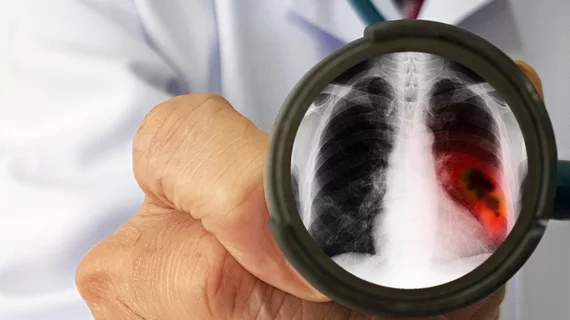Preoperative PET/CT imaging linked with better survival in advanced lung cancer
Patients with resectable non-small cell lung cancer (NSCLC) can benefit from preoperative PET/CT imaging.
New research published this week in Radiology indicates that preoperative PET/CT imaging in these patients increases overall survival depending on the cancer’s stage, with those diagnosed with stage 3A and 3B NSCLC appearing to benefit the most from the exam.
Experts involved in the study explained that although PET/CT scans are beneficial for detecting distant metastases, studies that assess how the scans impact survival are conflicting.
“The value of routine PET/CT use in the evaluation of resectable NSCLC remains controversial. There are no large randomized controlled trials demonstrating that routine use of PET/CT improves survival or reduces the rate of NSCLC,” corresponding author Szu-Yuan Wu, of the Division of Radiation Oncology, Cancer Center at Lo-Hsu Medical Foundation, and colleagues explained.
With this in mind, the researchers retrospectively examined more than 13,000 cases of patients who underwent thoracic surgery from January 1, 2009, to December 31, 2018, to look for associations between preoperative PET/CT and overall survival rates in patients with NSCLC. The patients were divided into two groups according to who did and did not complete a preoperative FDG PET/CT scan, and the primary outcome of interest was all-cause mortality in both groups.
Although the scans were found to be associated with lower risk of death, they had no significant impact on all-cause mortality, nor did they improve risks for patients with stage 1 or 2 NSCLC. Factors associated with decreased overall survival were male gender, advanced cancer stage, current and past smoking and undergoing treatment at non-medical centers.
Of note, recurrence-free survival was also superior in the PET/CT group.
The authors suggested that the increased overall survival in patients with 3A and 3B NSCLC can likely be attributed to better staging accuracy of more advanced cancers. They added that the utility of preoperative PET/CT in less advanced cancers is still not clear, and that histopathological confirmation should occur before surgery if imaging indicates disease spread in these patients.
“On the basis of our results, preoperative PET/CT should be encouraged in patients with stage IIIA–IIIB NSCLC to reduce the risk of unnecessary surgery and more accurately stage advanced disease,” the authors wrote. “If preoperative PET/CT is performed in patients with stage I–II NSCLC, most of the cases that are upstaged based on PET/CT findings should be confirmed through tissue sampling to avoid missing the opportunity for a surgical cure.”
View the study in Radiology.
Related lung cancer news:
A 'disconcerting' number of patients at high risk of lung cancer put off follow-up care
Pre-treatment chest CT features can predict overall survival in lung cancer patients
Downgrading lung nodules at 3-month follow-up 'may be problematic'
Stratifying patients by risk of poor outcomes could reduce overtreatment of lung cancer

